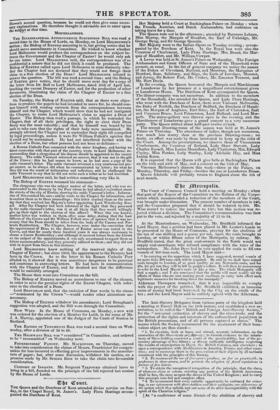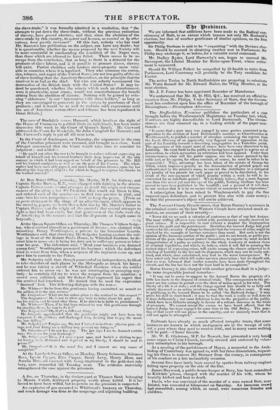The Anti-Slavery Delegates from various parts of the kingdom held
a meeting at Exeter Hall on the 18th instant, and established a new as- sociation, to be called the " British and Foreign Anti-Slavery Society," for the " universal extinction of slavery and the slave-trade, and the protection of the rights and interests of the enfranchised population in the British possessions, and of all persons captured as slaves." The means which the Society recommend for the attainment of their bene- volent object are thus stated— I. To circulate, both at home and abroad, accurate information on the enormities of the Slave-trade arliofflavery ; to furnish evidence to the inhabi- tants of Slave-holding countries t only of the practicability, but of the pe-
cuniary advantage of free labour; dinose authentic intelligence respecting
the results of emancipation in Hayti, the British Colonies, and elsewhere ; to open a correspondence with Abolitionists in America, France, and other coun- tries; and to encourage them in the prosecution of their objects by all methods consistent with the principles of this Society. " 2. To recommend the use of free-grown produce, as flee as practicable, in preference to slave-grown, and to promote the mbption of fiscal regulations in favour of free labour. "3. To obtain the unequivocal recognition of the principle, that the slave, of whatever clime or colour, entering any portion of the British dominions, shall be free, the stone as upon the shores of the United Kingdom ; and to carry this principle into full and complete effect. "4. To reconunend that every suitable opportunity be embraced for evinc- ing, in our intercourse with slave-holders and their apologists, our ahhorrence, of the systera which they uphold, and our sense of its utter incompatibility with the spirit of the Christian religion."
[At "a conference of some friends of the abolition of slavery and the slave-trade," it was formally admitted in a resolution, that "the attempts to put down the slave-trade, without the previous extinction of slavery, have proved abortive ; and that, since the abolition of the slave-trade by this country, its extent and horrors, as carried on by other nations, have greatly increased." Of this fact, nobody who has read Mr. Buxton's late publication on the subject, can have any doubt ; but it is questionable, whether the means proposed by the new Society will be more successful in ameliorating the condition of the Negro race, than those which are allowed to have failed. There seems to be no escape from the conclusion, that as long as there is a demand for the products of slave labour, and it is possible to procure slaves, slavery will exist. Partial abolition only renders slave-property more valu- able in countries where it is legalized. They who consume the cotton, rice, tobacco, and sugar of the United States, are not less guilty of the sin of slave-holding than the American themselves, on the principle that the receiver is as bad as the thief'. Yet who can soberly recommend the destruction of the British trade with the United States ? It may in- deed be questioned, whether the misery which such an abandonment, were it practicable, must create, would not counterbalance the benefit arising from the abolition of slavery. Nothing will be gained by evin- cing " abhorence" in our " intercourse with slave-holders," as long as they are encouraged to persevere in the system by purchases of their products ; and it would be as well to restrain such expressions until the use of American cotton-shirts and tobacco has been repudiated in Great Britain.]



























 Previous page
Previous page